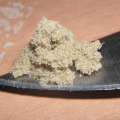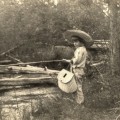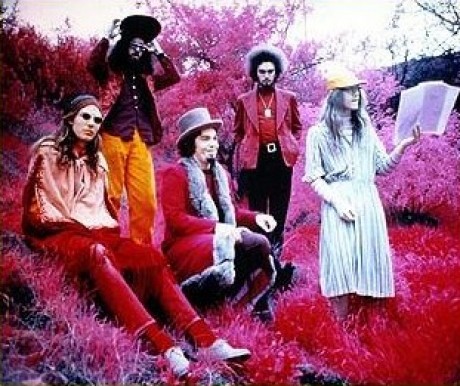Why I Love Captain Beefheart & His Magic Band
It's not just about the music, or the bizarre way he got his name. It's about freedom, mind-blowing lyrics and my best mate Johnny...
Challenged to name your favourite team, film, book, food or band by someone you’ve only recently met, the chances are that your inquisitor, whilst not necessarily agreeing with your choice, will nod politely and make either a neutral or positive comment before giving you their stock answer to the question they posed. You will reciprocate with the nods and niceties and the conversation will move on. They’re ice-breakers and none the worse for that and unless you are cornered by a pilled-up, spittle spraying nutter or playing a silly party game involving hats and Cheesy Wotsits, you are very rarely asked to reel off your whole list. One or two bland questions designed to elicit passive responses seem to oil the wheels. As a veteran watcher of natural history programmes I can confidently say that they are a classic example of non-aggressive social bonding. Think picking fleas off a chimp or sniffing a poodle’s jacksy.
It may come as a surprise to those with little or no knowledge of football fans that the ‘favourite team’ question is non-confrontational. I admit that a soccer virgin amongst the crowd in a spicy derby would have doubts and I can’t imagine Wembley with 90,000 avid readers flicking the V and questioning either JK Rowling’s parentage or Andy McNab’s sexuality. However, two opposing supporters who have been giving each other the vilest of dog’s abuse on Saturday afternoon may well meet each other for the first time that evening and end up singing the praises of their respective tricky little number eights, necking Jägerbombs and becoming each other’s wingman in ‘Flirtz Nite Club’.
Knowing isn’t necessarily doing. I have a problem with one of my stock answers to one of the stock questions. Or rather other people do. My anthropological expertise in facial expression and body language alerts me to their confusion and bewilderment which, in the animal world, could quickly result in the baring of teeth and barking. Time for an experiment. I’ll give you my list, you’ll react. Wolves, Raging Bull, Catch-22, Lamb, Beefheart. I knew it. You were nodding at the first four and then the frown kicked in. Either you’ve never heard of The Captain and you’re puzzled or you know the man and his canon and you’re equally as puzzled. In my defence I answered honestly, albeit realising the consequences. Ice firmly intact. Not as bad as sidling up to someone at a party and asking them who their favourite Nazi was, but a similar effect.
More…
Eric Drew Feldman On Captain Beefheart, Pixies And PJ Harvey
So, why Beefheart? To a certain extent you can lay the blame on Sir Billy Butlin. Until I was 12 my taste in music had been pretty conventional – Beatles, Stones and the Top 40 had predominated, then Ska and Soul took over. Tamla and table tennis were the order of the day at my local youth club and I and my mates embraced both to the full. It’s fair to say that we spent more time practising dancing than we did ping-pong with regular Sunday evening dance rehearsals in linoleum floored kitchens, honing our turns and backflips to perfection. Fast forward three years to 1970, five 15 year old lads who were primed to blow everyone off the Minehead holiday camp dance floor. We were pretty damn good, choreographed to perfection and looking immaculate in our Ben Sherman shirts, Sta-Prest strides and shiny ex-RAF shoes. This was set to be the pattern for the whole fortnight until one of a group of scruffy looking hippies asked the DJ to play a record that had just been released. As the first four bars of Free’s All Right Now kicked in, they kicked off. They were like a group of whirling dervishes, all arms and hair and my mates giggled while I watched gob-smacked. It was my musical epiphany and the next night, following the purchase of a rather tasty tie-dye T-shirt, I was dancing with them. I didn’t mind my mates ripping the piss out of me for the rest of the holiday, I’d seen the future. No more dancing by numbers, this was me expressing myself in a way I’d never realised was possible.
Come September and I was back at school, borrowing albums right, left and centre from people I’d previously never even acknowledged. Blodwyn Pig, Juicy Lucy and Taste were devoured with alacrity and then I got to know Johnny.
Johnny’s parents were quite comfortably off and they indulged him somewhat. This resulted in him having a big bedroom in a big house, a big record collection and a big stereo. “Ever heard any Beefheart?” he asked me the first time I was invited around. Then he put ‘Safe As Milk’ on. ‘All Right Now’ may have opened my mind but hearing this first track, only three months later, ripped it apart. Ry Cooder’s slide intro started a lifelong devotion to Captain Beefheart and his Magic Band that has never wavered.
Released in the same year as ‘Sgt. Pepper’, ‘Safe As Milk’ (1967) came across as something far ahead of its time. I knew little then about blues or jazz and consequently the fact that its musical roots went way back in time. It was 20 year old Cooder’s only album with Beefheart but the lad went on to do quite well.
Johnny then played ‘Strictly Personal’ (1968) and demonstrated his encyclopaedic knowledge of all things Beefheart while pacing up and down and waving his arms about. For me, this is the album’s stand out track.
I was on a roll by now and Johnny must have thought I was ready. Those first two albums are pretty accessible but if he was looking for a true fellow aficionado then the next record could prove to be the deal breaker. Much has been written about ‘Trout Mask Replica’ (1969), not least the virtual hostage situation in which Beefheart held the band, the psychological warfare he employed and the way he ‘wrote’ every single note (not being able to read or write music he worked at the piano, which he couldn’t play, with drummer John French transcribing the songs and teaching each band member their individual parts.) Once The Captain was satisfied that was it, woe-betide anyone who changed a single note let alone thought improvisation might be a good idea. Having billed himself as Captain Beefheart since the band’s inception, Don Van Vliet decided to rename all the other members. Bill Harkleroad, Jeff Cotton, Victor Hayden, Mark Boston and John French became, respectively, Zoot Horn Rollo, Antennae Jimmy Semens, The Mascara Snake, Rockette Morton and Drumbo.
Judging an album by its cover may be a dangerous game but one thing was for sure, this would be a little weirder than the preceding couple. And it was. And more than a little. In a sense Matt Groening and I listened to this album together – he’s 16 months older than me and he had first heard it, on its release, 16 months previously. This is his take on it.
“The first time I heard Trout Mask, when I was 15 years old, I thought it was the worst thing I’d ever heard. I said to myself, they’re not even trying! It was just a sloppy cacophony.
“Then I listened to it a couple more times, because I couldn’t believe Frank Zappa (Producer) could do this to me - and because a double album cost a lot of money. About the third time, I realised they were doing it on purpose: they meant it to sound exactly this way. About the sixth or seventh time, it clicked in, and I thought it was the greatest album I’d ever heard.”
It took me a while too but I got there.
There are a lot of tracks to choose from but this a cappella rendering of Orange Claw Hammer is a true master class in the power of a voice. I love it too because in a school of 630 boys only four, Johnny, Phil, Dean and me knew what the hell was going on when one of us would quote great globs of it.
The faithful amongst you will love this live version of the same song, with Frank Zappa on guitar.
Groening still believes it to be the greatest ever album. So do I.
How do you follow that? With this, that’s how. “Lick My Decals Off, Baby” (1970) was a worthy follow up and reputedly Beefheart’s favourite. Although the album was a critical success it wasn’t, as with all the others, a commercial one. This was despite this bizarre US TV ad of the time. It features the marvellous ‘Woe-is-uh-Me-Bop’, although the track that means most to me is ‘Peon’.
The next album is a chronological oddity, being the remainder of the sessions that, re-worked, produced ‘Strictly Personal’. Me and Johnny didn’t care, two of the tracks were over 15 minutes long, what’s not to like? Him on his bed, me on the sofa, both on our backs, eyes closed, big stereo cranked up. The eponymous ‘Mirror Man’ (1971).
The problem was that we had yet to see, or hear him, perform live. In those pesky pre-internet and three channel television days, the only way that that was going to happen was for him to come to the UK. With very little information in the music press we were fortunate that John Peel was a huge fan and champion of the man he often referred to as Don. I’ve no doubt that we learned of the 1972 tour dates and the new album that would precede them from Peel and for that, and for regularly playing Beefheart on his show, I am eternally grateful.
A New Year and a new album. The January release of ‘The Spotlight Kid’ (1972) gave us almost three months to absorb it before upcoming end of March concert. I love this album. It was Beefheart who got me into the blues and this is one of the finest blues records around. Turn up the big stereo for ‘Click Clack’ live.
Blackout, blue light, ballerina, belly dancer, bass solo, band, Beefheart. That’s the way to start a show. I saw them four times subsequently but that first time was the most enthralling and still rates as my all-time top gig. Just as important was the fact that he’d sold out Birmingham Town Hall twice on the same day. There were more of us than I thought. As a prophet in his own land, Beefheart appears to have struggled for such adulation in America. As Groening puts it.
“I saw him perform in 1970, when he came to the Paramount Theater in Portland, Oregon, and all seventy-five weirdos in the city showed up. These were the people the hippies had rejected. I remember the lights dimmed, and then Ed Marimba came out with a plastic toy raygun, pulled the trigger a few times to make sparks, and intoned the words ‘Raygun, raygun’ over and over again . . . finally concluding with ‘Ronnie Raygun’, who was already Governor of California. Then Drumbo came out and they played a duet for a while, and finally the whole band walked on. It was the best concert I’ve ever seen, easily.”
Ten months later saw the release of ‘Clear Spot’ (1972). Both Beefheart and the band were desperate to make some money; record sales barely covered costs and touring was a poor earner. They’d spent over five years working their bollocks off, living on welfare and the generosity of friends and family. The album is a deliberate attempt to broaden their appeal and while it didn’t achieve its aim it makes for interesting listening. The music and lyrics may be a little less avant-garde than previously but the playing is razor sharp. I had great fun when internet jukeboxes were introduced by putting ‘Big Eyed Beans from Venus’ on and standing back to watch the reaction. Sweet soul music? ‘Too Much Time’ does it for me.
1974 saw what many, including me and Johnny, reckoned was the beginning of the end. First up was ‘Unconditionally Guaranteed’. The attempt to produce a yet more accessible sound failed. The record was not only mauled by the critics, it was also roundly condemned by the musicians and, more importantly, resulted in the end of the Magic Band. There had, as with most bands, been one or two line-up changes over the years but this time the exodus was en masse. Whether they were pushed or whether they jumped depends on who you believe but the result was the same, Beefheart was on his own.
The blame for the meltdown lies fairly and squarely with the leader. It was Beefheart who was responsible for the direction the music took as well as every note played. His tortuous writing process meant that he needed musicians who could fully realise his vision and the Magic Band had spent eight years being drilled to perfection. His decision to go into a studio within six months with a totally new line up was questionable. We were worried.
We were right to be. ‘Bluejeans & Moonbeams’ is not a good Beefheart album. It’s barely a good album. The never increasing army of fans bought it, played it, put it away and slammed on ‘Trout Mask Replica’.
You’ll note that I haven’t put a link up for either of those albums. Enough said.
Four years of legal wrangles over master tapes and money followed, during which time Beefheart teamed up with Frank Zappa for the ‘Bongo Fury’ album and tour. He didn’t contribute a great deal and there was some irony in the fact that Zappa was the one refusing to hand over the tapes for the projected ‘Bat Chain Puller’ release.
What we got instead was ‘Shiny Beast (Bat Chain Puller)’ in 1978 and a return to some kind of form. The acid test was would me and Johnny listen to it and quote lyrics from it. It passed. How can you not resist singing, “Tropical Hot Dog Night, like two flamingos in a fruit fight?”
‘Doc at the Radar Station’ (1980) was also encouraging and whet our appetites for what turned out to be the last Beefheart gig Johnny and I went to. It was a cracker; the band went right through the catalogue and blew us away. ‘Making Love to a Vampire with a Monkey on My Knee’ anyone?
The Captain’s swan song came in 1982 with his final studio recording, ‘Ice Cream for Crow’. We were disappointed, not with the album but with the thought that there was so much more he could offer that would never come to fruition. Always a gifted artist, indeed a child prodigy, he retired from music to concentrate on his abstract paintings, examples of which adorn many of his record sleeves. There had been many bootlegs and compilations released over the years but none of them add anything to the official studio output, similarly the eventual issuing of ‘Bat Chain Puller’ (2012), 26 years after it was recorded and 2 years after Beefheart’s death, were a non-event.
Johnny never heard ‘Bat Chain Puller’ or of Beefheart’s death. He’d been murdered in our local in 2001. We’d shared a lot over the years, mostly a sense of humour and a love of Don Van Vliet. After Johnny’s death I neither laughed or listened to music for a very long time. I was fortunate though to be asked to give his eulogy and choose the music for his service. Beefheart featured in both. It was a joy to have hundreds of people sitting very quietly listening to a Beefheart tune.
Click here for more articles on Music in Sabotage Times
Click here to follow Sabotage Times on Twitter
Click here to follow Sabotage Times on Facebook
If you like it, Pass it on
 COMMENTS
COMMENTS
Nostalgic article,my favorite time of the Captain was 1970-72 and i saw him at the Rainbow in 72 with my hippy chums.On the way up from Essex our van was"busted by the pigs' and we almost late for the gig as they searched everything,what a night!I love the double header of Spotlight Kid and Clearspot.Feel all sad now! Tamlyn
Another class article Mr Blackhurst....think you should consider writing your memoirs?
Thanks Emma. I can't remember much. Young Fearghal has been on the case again - http://www.sabotagetimes.com/music/my-bloody-valentines-loveless-follow-up/
Cheer up Tamlyn. This should do it. Rockette Morton's opening bass solo in 72 was awesome. Looks like he's kept the practice up. http://www.youtube.com/watch?v=FaEjvgho3sk
Thanks for this, heard of him before ,obviously ,but never listened to him.Not sure what to make of it .but like you said it'll take a few listens . I'll give him a go!
Not a fan of The Captain but another great piece Dave. I'n my top one of Sabotage Times contributors.
An amazing erudite journey Dave - not sure, as my musical background is not that cultivated, i recognized all the references - but beautifully written.
one of the most difficult artists to get in to in my opinion. Safe as milk is probably the easiest album to listen to, fairly bluesy and simply structured. I would recommend this album to anybody with christmas vouchers, stood in hmv with "record shop block"
oops
I think, I think this is the best batch yet.


 RELATED
RELATED







 SABOTAGE
SABOTAGE





